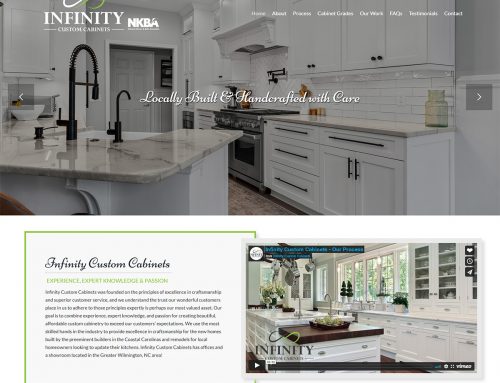“I’m just not sure that SEO is going to help me,” Jack told me on the phone. “My customers just are not searching for me on the internet.”
My friend Jack is an entrepreneur, and has successfully started and managed an interior trim installation business for the last 8 years. With the ebb and flow of the construction industry his company has grown and shrank, and today he has a strong company with a couple of employees, but he wants to grow and expand so that he can work less in the field and more in the office. He plans to accomplish this by expanding his market to include a neighboring city.
“So how would your customers find you?” I ask. “And who is your ideal customer?”
“My ideal customer is a local custom homebuilder,” Jack replied, “and typically when they are searching for a new tradesperson they will ask their lumber supplier or a competing builder for a reference. They are not going to Google to look for a new carpenter.”
I could not argue with this, because Jack is right. My experience in the homebuilding industry in years past backed this up. That industry is a closed group, and most tradesmen are not good marketers, relying on word of mouth and relationships to win them new business. In this environment, money spent on search engine optimization would be wasted. As much as I have seen the success and exposure that SEO can bring, in this situation it just would not be effective.
In today’s complex world, there is no true “one-size-fits-all” solution for marketing one’s business services. An analytical process is needed that yields a custom fit marketing plan. Your business has unique resources, unique customers, and unique solutions. Why should the process by which you reach these customers be any different?
I can safely say that 80% of our customers can benefit from Search Engine Optimization. An equal number can benefit from social media campaigns. So to say that everyone needs SEO or that everyone needs a Facebook strategy would not be accurate. I cringe when I talk to salespeople from marketing companies that are trying to shoehorn customers into a specific package or program they offer, with no regard to the unique needs of that company.
There is a better way to do this! It begins with customer analysis – who is your customer? Why do they need your product, and what makes them purchase? Where are they looking when they need your service? What does it take for them to feel enough trust to make a purchase decision? Once you’ve answered these questions, you can begin to draw straight lines to what your marketing plan needs to include.
In my friend Jack’s case, we recognized that a large website with SEO and social media campaign was not going to produce good return on investment. Instead we focused on who exactly his ideal customers were. In this case we performed an internet search for custom builders in the city he wanted to expand into, and came up with a list of twenty building firms to target. We then zeroed in on what action Jack wanted the marketing campaign to prompt: a request for proposal. We then designed a two part plan to reach these firms: phase 1 was to design and launch a one page website (with parallax scrolling for whiz-bang effect) that Jack could personalize and tweak himself to keep costs down. Phase 2 was to create something of value that could be hand delivered to these firms to show professionalism and provide initial value – for Jack we designed a large printed cardboard case to display interior trim samples that a builder could use for trim selections for custom home clients, along with an “Interior Trim Takeoff Form” that would simplify interior trim estimating and ordering. Both these items would display Jack’s company logo and contact information, and the takeoff form would advertise Jack’s free proposals.
A simple, targeted marketing plan will outperform a generic scattershot approach and will, in many cases, cost significantly less. In this situation Jack would have been throwing money into the wind with search engine optimization, but was spending money wisely targeting his few potential customers.
I talk to a lot of business owners and marketing directors who say “why do I need SEO?” In response, I say to them, and to you, “you only need SEO if your potential customers would look for you through a Google or Bing or Yahoo search.” This is 80% of you out there. While to Jack’s carpentry business SEO was not helpful, it is critical to the custom builder he wants to work for, because his customers are looking for a new builder on the internet.
Is SEO needed for your company? Will it help you reach new clients? Conquer new markets? Improve your lead pipeline? If your customers are looking for what you sell on the internet, then it is absolutely needed.
If you don’t need SEO, then by all means don’t chase it. But if you do need SEO, then why not take advantage of the opportunities it can unlock?
If you are interested in Impact Media Solutions assisting you with your Search Engine Optimization, contact us today to get started.




